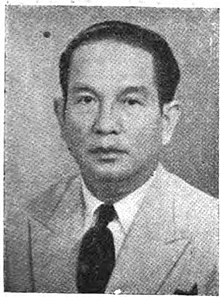Sartono | |||||||||||||||||
|---|---|---|---|---|---|---|---|---|---|---|---|---|---|---|---|---|---|
 Official portrait, c. 1958 | |||||||||||||||||
| 1st Speaker of the People's Representative Council | |||||||||||||||||
| In office 23 February 1950 – 24 June 1960 | |||||||||||||||||
| Preceded by | Office created | ||||||||||||||||
| Succeeded by | Zainul Arifin | ||||||||||||||||
| |||||||||||||||||
| |||||||||||||||||
| Personal details | |||||||||||||||||
| Born | 5 August 1900 Wonogiri, Dutch East Indies | ||||||||||||||||
| Died | 15 October 1968 (aged 68) Jakarta, Indonesia | ||||||||||||||||
| Resting place | Astana Bibis Luhur | ||||||||||||||||
| Political party | Indonesian National Party (1927–1931; 1945–1968) | ||||||||||||||||
| Other political affiliations | |||||||||||||||||
| Spouse |
Siti Zaenab (m. 1930) | ||||||||||||||||
| Children | 3 | ||||||||||||||||
| Alma mater | Leiden University (Mr.) | ||||||||||||||||
| Occupation |
| ||||||||||||||||
| Signature |  | ||||||||||||||||
Sartono (5 August 1900 – 15 October 1968) was an Indonesian politician and lawyer who served as the first speaker of the People's Representative Council (DPR) from 1950 until 1960. Born to a noble ethnic-Javanese family, Sartono studied law at Leiden University. During his studies, he joined the Perhimpoenan Indonesia association and became an advocate for Indonesian independence. After graduating, he opened a law practice and helped found the Indonesian National Party (PNI) in 1927. When several party leaders were arrested by the colonial government in 1929, he became one of their defense lawyers and unsuccessfully argued for their acquittal. Following the arrest of its leaders, PNI became paralyzed and the party subsequently suspended its activities. In its place, Sartono founded a new political party, Partindo, which sought to achieve independence through non-cooperation and mass action. Partindo lasted until 1936, when it decided to dissolve itself. After Partindo's dissolution, Sartono helped found another party, Gerindo, which advocated for the creation of an Indonesian parliament.
Following the Japanese invasion of the colony in 1942, Sartono briefly left politics, before returning to serve as the general-secretary of a Japan-founded labor organization, Putera, in 1943. He subsequently served in several positions during the Japanese occupation period, including as a member of the Central Advisory Council and Investigating Committee for Preparatory Work for Independence. After the proclamation of Indonesian independence in 1945, he was appointed one of five ministers of state in the Presidential Cabinet by Sukarno. As minister, Sartono was dispatched to the Yogyakarta Sultanate and Surakarta Sunanate to shore up support for the nationalist government. During the subsequent national revolution, he became a member of the Central Indonesian National Committee (KNIP), the provisional legislature, and served in the KNIP's working body, which ran the legislature's day-to-day affairs. He then served as an advisor to the Indonesian delegation of the Dutch–Indonesian Round Table Conference before being elected speaker of the DPR of the United States of Indonesia in February 1950.
Sartono served as speaker of the DPR throughout the entirety of the liberal democracy period, being re-elected in August 1950, when the Provisional DPR was formed following the transition into a unitary state, and again in 1956, after legislative elections were held. Following the fall of Mohammad Natsir's Cabinet in 1951, Sartono was appointed formateur by Sukarno. His efforts were thwarted due to policy differences between the two largest parties, the PNI and Masyumi Party, and he returned his mandate after less than a month. Following Mohammad Hatta's resignation from the vice presidency in 1956, Sartono was legally second in the presidential line of succession and he conducted presidential duties on multiple occasions. In 1960, the DPR was suspended by Sukarno as it rejected the government’s budget. Sartono was deeply embittered by the DPR's suspension, and he subsequently resigned from the DPR and did not take public office for several years. In 1962, Sartono accepted an offer by Sukarno to serve as the deputy chairman of the Supreme Advisory Council (DPA). His time in the body "confused and irritated him,"[1] and he eventually resigned from the DPA in 1968. He died in Jakarta, on 15 October 1968, and was buried at Astana Bibis Luhur, Surakarta.
© MMXXIII Rich X Search. We shall prevail. All rights reserved. Rich X Search
